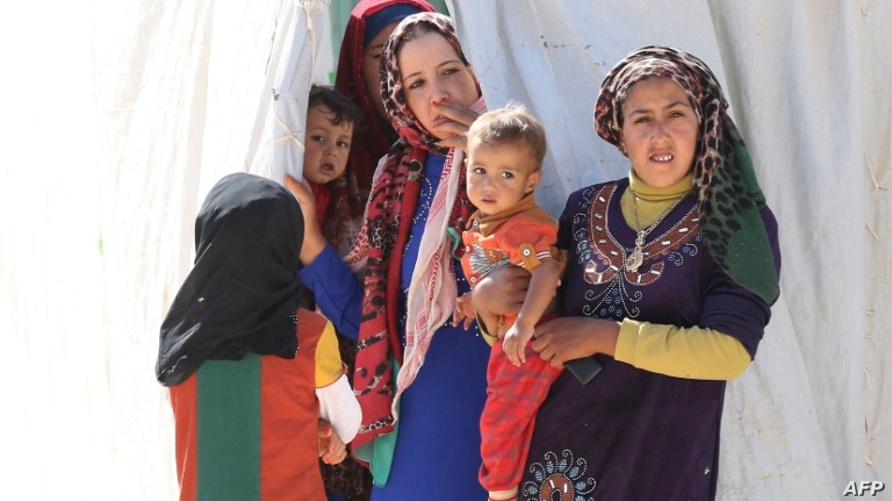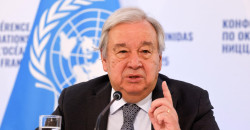Sexual violence in conflict: Overlooked, under-reported and in danger of being “normalized”

Shafaq News/ As militants boasted about how they would divide the girls among themselves, Khetam*, a Syrian refugee in Iraq, feared for her life. “Two commanders had chosen me and my friend as their brides,” she recalled to UNFPA. The so-called “marriage” would mean rape and control for as long as the militants desired. “When we objected that we were too young to wed, they beat us and tortured us for most of that night, until we had no choice but to relent.”
Sexual violence in conflict settings remains widespread and systematic, a recent report by the United Nations Secretary-General found, fuelled by “rising inequality, increased militarization, reduced civic space and the illicit flow of small arms and light weapons, among other factors.” Conflict-related sexual violence – which includes assault, rape, forced marriage, trafficking, sexual slavery, forced sterilization, forced abortion other forms of sexual coercion – is used to instill fear, pain, suffering and censorship in its targets. Survivors, as well as their families, endure long-term consequences, from post-traumatic stress, unintended pregnancies, sexually transmitted infections and social stigma to the threat of retaliation should they seek legal advice or report the attacks.
As crises proliferate and conflicts drag on, more women and girls are telling UNFPA that violence against them is becoming “normalized” – a disturbing and growing collective acceptance of this crime, usually while both protection mechanisms and legal accountability for perpetrators crumble in the chaos of conflict.
Maya*, a Syrian refugee in Jordan, described how “many of my friends have experienced this [gender-based violence], some on a daily basis. They are continuously harassed, beaten, and forced to marry so young when they don’t want to… it ends up harming and sometimes killing them.”
Physical and psychological barriers to supporting survivors
Access to health care, including psychosocial and sexual and reproductive health services, is severley disrupted in conflict settings, while humanitarian delivery of essential services is fraught with challenges. From pervasive instability to destroyed roads and infrastructure and obstructed access, those most in need are most often the hardest to reach. Even when services are available, survivors may be afraid to seek them out due to shame or a fear of being ostracized by their communities, or further punished by their attackers.
In South Sudan, which is recording soaring rates of sexual violence as conflict rages on, just leaving home to seek basic necessities is rife with danger. For 14-year-old Achol*, fetching water was enough to put her life in jeopardy. “When I was at the tap, a strange man walked towards me. He grabbed me and stuffed a t-shirt in my mouth, dragging me to an abandoned building where he raped me and threatened to kill me." Her attacker has yet to be apprehended.
Entrenched gender inequality is as much a driver of sexual violence as it is a barrier to preventing it. The threat of violence often robs girls of their education, fear shuttering them in their homes to take on ever more onerous household and caregiving duties. Survivors can suffer debilitating injuries and be shunned by society and their families.
UNFPA Executive Director Dr. Natalia Kanem described the prevalence of and lack of accountability for sexual violence in conflict as largely “due to the persistence of blatantly discriminatory ideas, including men thinking they are entitled to the ‘spoils’ of war and that women and girls are useable and disposable.”
Challenges of reporting on a “silent crime”
For every survivor who is able to tell their story, there are thousands who will be forever silent – or silenced. Sexual violence is a vastly under-reported crime even in peacetime. In conflict settings, the barriers to reporting only multiply. Many citizens, journalists and humanitarians who promote accountability or do manage to report these crimes to the world are also persecuted for their work.
UNFPA is launching a campaign to amplify the voices of survivors and counter the risk of normalizing violence against women and girls, especially in crisis settings. The human rights of survivors must be at the heart of all responses to sexual violence, with sexual and reproductive health and information a non-negotiable part of that.
UNFPA’s programmes in crisis contexts supported 2.3 million survivors of gender-based violence in 2021 and assisted some 1,000 health facilities in 38 countries to provide specialized care. Agency and partner staff were on the ground across the world as crises broke out and needs spiked, including for supplies of post-rape kits and emergency contraception.
But the grim reality on the ground for the most vulnerable stands in unforgiving contrast to the ambitions of organizations like UNFPA striving to assist them: Experts say the already shocking statistics on sexual violence are only scratching the surface of the as-yet unknown true figures.
Calling on the international community to mobilize immediately in the light of horrific reports of sexual violence coming out of the war in Ukraine, UN Special Representative Pramila Patten said, “An active battle-ground is never conducive to accurate ‘book-keeping’ […] if we wait for hard data and statistics, it will always be too late. We do not need hard data for a scaled-up humanitarian response.”
Source: UNFPA

